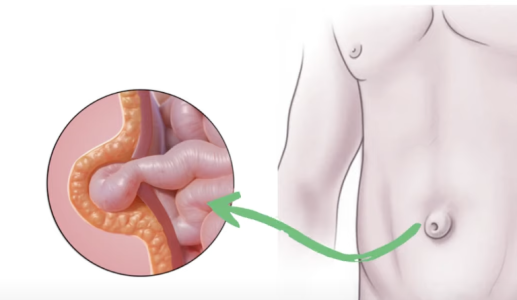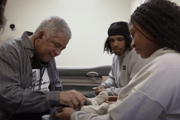Are you missing these 8 early signs of a hernia? What to watch for—and when to act
By
Veronica E.
- Replies 0
Disclaimer: The information provided in this article is for educational purposes only and is not intended as a substitute for professional medical advice, diagnosis, or treatment. Always consult your physician or other qualified healthcare providers with any questions you may have regarding a medical condition or before making any changes to your health regimen.
As we age, our bodies often find ways to surprise us—whether it’s a new ache, a bump that wasn’t there yesterday, or a sudden discomfort while lifting something light.
One condition that tends to fly under the radar, especially for older adults, is the hernia.
While you might associate hernias with heavy lifting or strenuous activity, they’re actually quite common in people over 60.
In fact, nearly 1 million Americans undergo hernia surgery each year.
The good news? Early detection can prevent serious complications and may even spare you from emergency surgery.
What is a hernia, exactly?
A hernia occurs when tissue—often part of the intestine—pushes through a weak spot in the muscle or connective tissue, usually in the abdomen or groin.
Think of it like a worn-out spot in fabric, where something starts to poke through.
It may appear as a bulge or lump, and it often becomes more noticeable when you stand up, cough, or strain.
Some hernias are easy to spot.
Others are more subtle and may not cause pain at all—at least at first.

Here are 8 symptoms that could signal a hernia:
1. A visible or touchable bulge
Often in the abdomen or groin, this lump may grow larger when you're upright or active, and shrink when you lie down. Even if it’s not painful, it could still be serious.
2. Pain or discomfort
Sharp or dull pain can show up during physical activity, bending, or lifting. Women may notice discomfort during menstruation or intimacy.
3. A feeling of pressure or heaviness
Some hernias cause a dragging or pressing sensation rather than pain—especially after standing or walking for a while.
Also read: Stop suffering: How to tell if it's norovirus or just a "stomach bug"
4. Nausea or vomiting
If a hernia becomes “incarcerated” (trapped), it can block the intestines and lead to nausea or vomiting. This requires immediate medical care.
5. Constipation or trouble passing gas
A blocked bowel from a hernia can interfere with digestion. If you can’t pass gas or use the bathroom, don’t ignore it.
6. Fever
A high temperature could mean the trapped tissue is becoming infected. If you have a fever along with any of the above symptoms, seek help right away.
Also read: Is your stomach trying to tell you something? Hidden signs you might have food poisoning
7. Redness or skin discoloration
Skin that turns red, purple, or dark near the hernia site could mean the blood supply is cut off—another emergency signal.
8. Numbness or tingling
Loss of sensation in the area may indicate pressure on nearby nerves or blood vessels. Call your doctor if this happens.
Why hernias can become dangerous quickly
While many hernias start as a minor inconvenience, they don’t heal on their own.
Over time, they tend to grow larger and carry a greater risk of serious complications, such as incarceration (trapped tissue) or strangulation (loss of blood supply).
These situations can lead to tissue death and potentially life-threatening infection.
Dr. Maria S. Altieri, a surgeon at Penn Medicine, explains: “The danger of hernias is the risk of incarceration and strangulation. These two conditions are considered an emergency, and patients should seek immediate medical attention.”
Also read: What was really in her salad? NYC woman claims rat in bowl, eatery says not possible
Who’s more likely to develop a hernia?
Age is a big factor, since muscles naturally weaken over time. Other risk factors include:
How hernias are diagnosed
Your doctor will usually begin with a physical exam, asking you to stand or cough while they check for a bulge.
If the hernia isn’t easily visible, they may order an ultrasound, CT scan, or MRI for a better look.
If a hernia is confirmed, you’ll likely be referred to a surgeon to discuss your treatment options.
Does every hernia require surgery?
Not always. If the hernia is small and not causing pain, your doctor may recommend a “watch and wait” approach.
But in most cases, hernias do get worse over time.
According to the FDA, 30% to 65% of hernias eventually require scheduled surgery, while 3% to 5% end up in the ER due to strangulation or obstruction.
Also read: Suffering from heartburn or acid reflux? Discover the coffees that won't make it worse!
What to expect from hernia surgery
There are a few different surgical approaches:
Surgeons often use surgical mesh to reinforce the area.
While mesh reduces recurrence rates, hernia repair isn’t always permanent—a 2022 JAMA study found that about 16% of patients required another surgery within 10 years.
The larger or longer-ignored the hernia, the more complex the surgery can become.
What happens if you ignore it?
Hernias don’t disappear.
In one study, 70% of men who chose to delay surgery for an inguinal hernia ended up needing the procedure within five years—often under more difficult conditions.
Acting early can mean fewer complications and a smoother recovery.
Your next steps: What to do if you’re concerned
Staying aware of the early signs of a hernia—and acting on them—can make all the difference in protecting your health.
Whether it’s a mild bulge or a more serious symptom, don’t brush it off.
A quick conversation with your doctor could save you from more serious trouble down the road.
Read next: Say goodbye to back pain with these sleep positions – you won’t believe #3!

Have you or a loved one experienced a hernia? What helped you manage the recovery? Share your stories and advice in the comments—your experience might make all the difference for someone else in the GrayVine community!
As we age, our bodies often find ways to surprise us—whether it’s a new ache, a bump that wasn’t there yesterday, or a sudden discomfort while lifting something light.
One condition that tends to fly under the radar, especially for older adults, is the hernia.
While you might associate hernias with heavy lifting or strenuous activity, they’re actually quite common in people over 60.
In fact, nearly 1 million Americans undergo hernia surgery each year.
The good news? Early detection can prevent serious complications and may even spare you from emergency surgery.
What is a hernia, exactly?
A hernia occurs when tissue—often part of the intestine—pushes through a weak spot in the muscle or connective tissue, usually in the abdomen or groin.
Think of it like a worn-out spot in fabric, where something starts to poke through.
It may appear as a bulge or lump, and it often becomes more noticeable when you stand up, cough, or strain.
Some hernias are easy to spot.
Others are more subtle and may not cause pain at all—at least at first.

Hernias often appear as a bulge in the abdomen or groin and can cause discomfort or serious complications if left untreated. Image Source: YouTube /
@kghospital.
@kghospital.
Here are 8 symptoms that could signal a hernia:
1. A visible or touchable bulge
Often in the abdomen or groin, this lump may grow larger when you're upright or active, and shrink when you lie down. Even if it’s not painful, it could still be serious.
2. Pain or discomfort
Sharp or dull pain can show up during physical activity, bending, or lifting. Women may notice discomfort during menstruation or intimacy.
3. A feeling of pressure or heaviness
Some hernias cause a dragging or pressing sensation rather than pain—especially after standing or walking for a while.
Also read: Stop suffering: How to tell if it's norovirus or just a "stomach bug"
4. Nausea or vomiting
If a hernia becomes “incarcerated” (trapped), it can block the intestines and lead to nausea or vomiting. This requires immediate medical care.
5. Constipation or trouble passing gas
A blocked bowel from a hernia can interfere with digestion. If you can’t pass gas or use the bathroom, don’t ignore it.
6. Fever
A high temperature could mean the trapped tissue is becoming infected. If you have a fever along with any of the above symptoms, seek help right away.
Also read: Is your stomach trying to tell you something? Hidden signs you might have food poisoning
7. Redness or skin discoloration
Skin that turns red, purple, or dark near the hernia site could mean the blood supply is cut off—another emergency signal.
8. Numbness or tingling
Loss of sensation in the area may indicate pressure on nearby nerves or blood vessels. Call your doctor if this happens.
Why hernias can become dangerous quickly
While many hernias start as a minor inconvenience, they don’t heal on their own.
Over time, they tend to grow larger and carry a greater risk of serious complications, such as incarceration (trapped tissue) or strangulation (loss of blood supply).
These situations can lead to tissue death and potentially life-threatening infection.
Dr. Maria S. Altieri, a surgeon at Penn Medicine, explains: “The danger of hernias is the risk of incarceration and strangulation. These two conditions are considered an emergency, and patients should seek immediate medical attention.”
Also read: What was really in her salad? NYC woman claims rat in bowl, eatery says not possible
Who’s more likely to develop a hernia?
Age is a big factor, since muscles naturally weaken over time. Other risk factors include:
- Chronic coughing or sneezing (due to allergies, asthma, or COPD)
- Heavy lifting or straining
- Obesity
- Constipation
- Previous abdominal surgery
- Pregnancy
How hernias are diagnosed
Your doctor will usually begin with a physical exam, asking you to stand or cough while they check for a bulge.
If the hernia isn’t easily visible, they may order an ultrasound, CT scan, or MRI for a better look.
If a hernia is confirmed, you’ll likely be referred to a surgeon to discuss your treatment options.
Does every hernia require surgery?
Not always. If the hernia is small and not causing pain, your doctor may recommend a “watch and wait” approach.
But in most cases, hernias do get worse over time.
According to the FDA, 30% to 65% of hernias eventually require scheduled surgery, while 3% to 5% end up in the ER due to strangulation or obstruction.
Also read: Suffering from heartburn or acid reflux? Discover the coffees that won't make it worse!
What to expect from hernia surgery
There are a few different surgical approaches:
- Open surgery: A single, larger incision to repair the hernia.
- Laparoscopic or robotic surgery: Smaller incisions with faster recovery times for many patients.
Surgeons often use surgical mesh to reinforce the area.
While mesh reduces recurrence rates, hernia repair isn’t always permanent—a 2022 JAMA study found that about 16% of patients required another surgery within 10 years.
The larger or longer-ignored the hernia, the more complex the surgery can become.
What happens if you ignore it?
Hernias don’t disappear.
In one study, 70% of men who chose to delay surgery for an inguinal hernia ended up needing the procedure within five years—often under more difficult conditions.
Acting early can mean fewer complications and a smoother recovery.
Your next steps: What to do if you’re concerned
- Do a quick self-check: If you feel a bulge or pressure, pay attention.
- See your doctor: Early detection can lead to better outcomes.
- Don’t wait in an emergency: If you’re experiencing severe pain, vomiting, redness, fever, or numbness, go to the ER immediately.
Staying aware of the early signs of a hernia—and acting on them—can make all the difference in protecting your health.
Whether it’s a mild bulge or a more serious symptom, don’t brush it off.
A quick conversation with your doctor could save you from more serious trouble down the road.
Read next: Say goodbye to back pain with these sleep positions – you won’t believe #3!
Key Takeaways
- Hernias occur when tissue or an organ pushes through muscle, often creating a bulge in the abdomen or groin, and can cause symptoms ranging from pain and aching to more serious signs like nausea, vomiting, constipation, fever, redness, or numbness.
- Serious complications, such as incarceration and strangulation (where the hernia gets stuck and cuts off blood supply), are medical emergencies that require urgent attention to avoid tissue damage or death.
- Diagnosis is usually made by a doctor with a physical exam, and may involve imaging like CT, MRI, or ultrasound; most hernias worsen over time and tend to eventually need surgery, which can be open or minimally invasive.
- Surgical mesh is commonly used to reduce recurrence, but hernias still can return, especially after repeated surgeries or if left untreated for too long; delaying necessary surgery increases the risk of major complications.
Have you or a loved one experienced a hernia? What helped you manage the recovery? Share your stories and advice in the comments—your experience might make all the difference for someone else in the GrayVine community!






